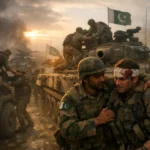Rising Hatred Against Muslims in India and the Threat of Genocide
Over the past decade, India has witnessed a dramatic surge in hate crimes, violence, and mob lynchings targeting Muslims. These are not isolated incidents but part of a systematic and dangerous trend that could lead to genocide based on religious and ethnic grounds. Human rights organizations, such as Human Rights Watch and Amnesty International, have repeatedly warned that this hateful environment is fueling organized attacks against Muslims. Experts argue that the politics of Hindutva has pushed the country toward division, portraying Muslims as second-class citizens.
Transformation Under Narendra Modi’s Regime
Since Narendra Modi and his Bharatiya Janata Party (BJP) came to power in 2014, hatred against Muslims has intensified. The BJP and its allied groups have been promoting the ideology of “Hindutva,” which aims to transform India into a “Hindu Rashtra,” or a purely Hindu state. This ideology stems from the Rashtriya Swayamsevak Sangh (RSS), a paramilitary organization that promotes Hindu nationalism. The RSS trains thousands of youths in weapons at its camps, effectively forming militias rooted in Hindutva ideology. This trend has persisted into Modi’s third term, with attacks on Muslims continuing to rise. Hindutva has created a deep divide between Hindu and Muslim communities, with Muslims increasingly depicted as enemies of the state.
Hate and Discrimination against Indian Muslims
Religious slogans like “Jai Shri Ram” have been weaponized. Muslims are often forced to chant this slogan, and refusal leads to violence. For instance, in 2024, two Muslim men were killed by a Hindu right-wing mob in Chhattisgarh over allegations of cow smuggling. Similarly, in Haryana in 2024, a Muslim youth was killed in the name of cow protection.
Muslim street vendors are beaten solely based on their identity. In 2017, a Muslim man in Alwar was lynched by a mob over cow protection, and such incidents continue. A 14-year-old Muslim boy was assaulted for entering a temple to drink water.
Moreover, the controversial Citizenship Amendment Act (CAA) passed in 2019 grants citizenship to refugees but excludes Muslims. This law is discriminatory and relegates Muslims to second-class status. In the same year, the special constitutional status of Kashmir (Article 370) was revoked, imposing severe restrictions on its Muslim population and suspending communication systems for months. Protests against the CAA resulted in hundreds of deaths, predominantly Muslims.
Dehumanization of Muslims
Muslims in India are labeled as “Bengalis,” “insects,” “infiltrators,” and “termites.” BJP chief Amit Shah referred to Muslim migrants as “termites,” a term that dehumanizes them. Such language is a hallmark of the early stages of genocide.
Narratives like “love jihad” and “corona jihad” have been fabricated to portray Muslims as enemies. The “love jihad” conspiracy theory claims Muslim men lure Hindu women into marriage to convert them, leading to laws in several states targeting Muslim men and restricting women’s autonomy.
Online platforms have been used to target Muslim women, with fake auctions organized to harass them. In 2022, the “Bulli Bai” app used images of hundreds of Muslim women for fake auctions, marking a new form of hate. Earlier, the “Sulli Deals” app similarly targeted Muslim women for “bidding.”
Organized Groups and State Patronage
The Sangh Parivar and its affiliated organizations promote Hindu nationalism and provide weapons training to their workers. RSS camps train militias based on Hindutva ideology, which are used against Muslims. Muslims have been prevented from offering Friday prayers at several locations, and historic mosques have been attacked with attempts to convert them into temples. For example, after the destruction of the Babri Masjid, the Gyanvapi Mosque faced attacks, and in 2022, campaigns targeted thousands of mosques. In 2025, a mosque in Ratnagiri was attacked.
Preparations for Massacres and Historical Precedents
In recent years, Hindu extremist groups have used code words like “gobhi kheti” (cabbage farming), which allude to past massacres of Muslims. In 2021, a religious conference (Dharma Sansad) in Haridwar openly called for the genocide of Muslims, with Hindu religious leaders making hate-filled speeches that went viral.
The 2002 Gujarat riots, during Modi’s tenure as Chief Minister, saw over 2,000 Muslims killed. Independent investigations confirmed these attacks were planned, with police instructed to remain passive. In Naroda Patiya, 97 Muslims, including women and children, were killed.
Current Dangerous Situation
While large-scale massacres have not yet occurred, the 2020 Delhi riots resulted in 53 deaths, mostly Muslims. Investigations revealed that the violence was planned, with some police officers complicit. Delhi Police investigations showed bias, targeting Muslim protesters. Lynchings continued in 2024, such as the killings of Muslims in Bhawani.
Conclusion
The situation for Muslims in India is becoming increasingly perilous. Experts warn that hate campaigns and discriminatory laws are early indicators of genocide. If this trend is not halted, India risks descending into a major humanitarian crisis in the near future. Human rights organizations caution that this politics of hate is eroding India’s democracy.


















